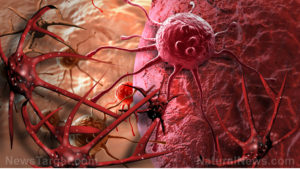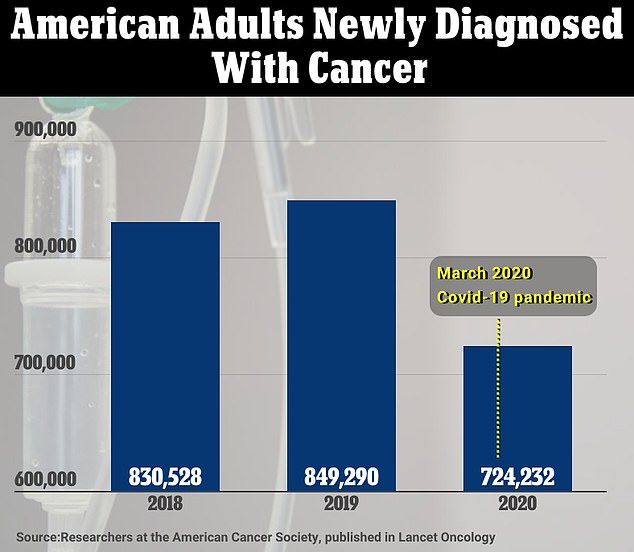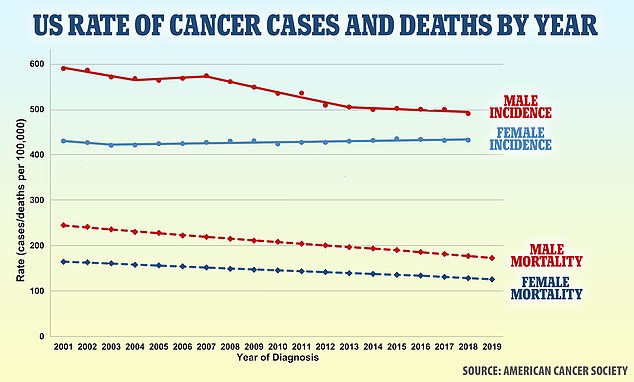Study shows hundreds of thousands of Americans missed out on a diagnosis during Covid – when hospitals prioritized virus and lockdowns left patients too scared to come forward
 The US is facing a cancer timebomb because hundreds of thousands of patients missed out on a diagnosis during the Covid-19 pandemic.
The US is facing a cancer timebomb because hundreds of thousands of patients missed out on a diagnosis during the Covid-19 pandemic.
A new analysis shows rates of new cancer patients fell by around 15 percent in 2020 compared to 2019, the equivalent of around 125,000 fewer diagnoses.
However, the true number of missed cancers could be even higher, possibly by hundreds of thousands, based on the recent increasing trends of diagnoses.
It is the latest in a long line of studies to show that while lockdowns and social distancing measures aimed at reducing the spread of Covid had knock-on effects on other parts of society.
During Covid, many healthcare systems reduced access to routine care, preventing people from seeing their doctors, getting screenings and undergoing diagnostic tests.

The above graph shows the steep decline in new cancer diagnoses following the start of the Covid-19 pandemic in 2020
The study, published Tuesday in Lancet Oncology, is the most comprehensive research to date about the impact of the pandemic on cancer diagnoses in the US.
Researchers from the American Cancer Society collected data from the 2020 national registry data, the most recent available, to identify 2.4 million adults with newly-diagnosed cancer from 2018 to 2020.
The national registry is a database that collects information on cancer from certain institutions and states.
Researchers found that in 2018, there were 830,528 people newly diagnosed with cancer. In 2019, there were 849,290 people diagnosed. And, in 2020, 724,232 people were newly diagnosed with cancer.
The biggest decline in diagnoses was among stage 1 cancers, or the earliest phase of the disease. Missing these runs the risk of the cancer spreading by the time it is caught, making it much harder to treat.
The data also found that people who have historically experienced barriers to healthcare access were impacted the most.
These people include individuals who are Hispanic, Asian American and Pacific Islander, uninsured, and living in socioeconomically deprived areas.
‘During the emergence of the pandemic, we know health care was disrupted in the US and steep declines were reported for cancer screening services,’ said Dr. Xuesong Han, lead author of the study and scientific director of health services research at the American Cancer Society.
‘These updated results for all major cancer types nationwide represent a more comprehensive view and continue to be concerning as decreased screening, as well as delayed and forgone routine check-ups or doctor visits, can lead to under diagnosis of cancer, especially in early stages, where treatment is most effective’.
While the ACS study only looked at data until 2020, experts are concerned the missed and delayed cancer diagnoses will lead to increased cancer deaths in the future because treatment was delayed and the disease advanced past a point where treatment is effective and curative. However, experts say we may not see this reflected in data for years.
The Centers for Disease Control and Prevention also attributed the decline in new cancer cases to the pandemic.
‘The COVID-19 pandemic disrupted health services, leading to delays and reductions in cancer screening, diagnosis, and reporting to some central cancer registries. This may have contributed to an observed decline in 2020 incidence for most cancer sites’, the agency said.

The above graph shows the cancer diagnosis rates (top lines) and fatality rates (bottom lines) for males (red) and females (blue) since the start of this century. It reveals that fatality rates are trending downwards overall, while case rates are steady
The new data comes a week after President Joe Biden claimed to have cured cancer during a White House speech.
However, contrary to Biden’s claim, his administration has not ‘ended cancer as we know it’.
The cancer death rate has fallen just 1.5 percent a year since 2020, a rate that makes it impossible to reach the president’s goal of reducing the cancer death rate by half in the next quarter-century.
Written by Alexa Lardieri for the The Daily Mail ~ August 1, 2023
